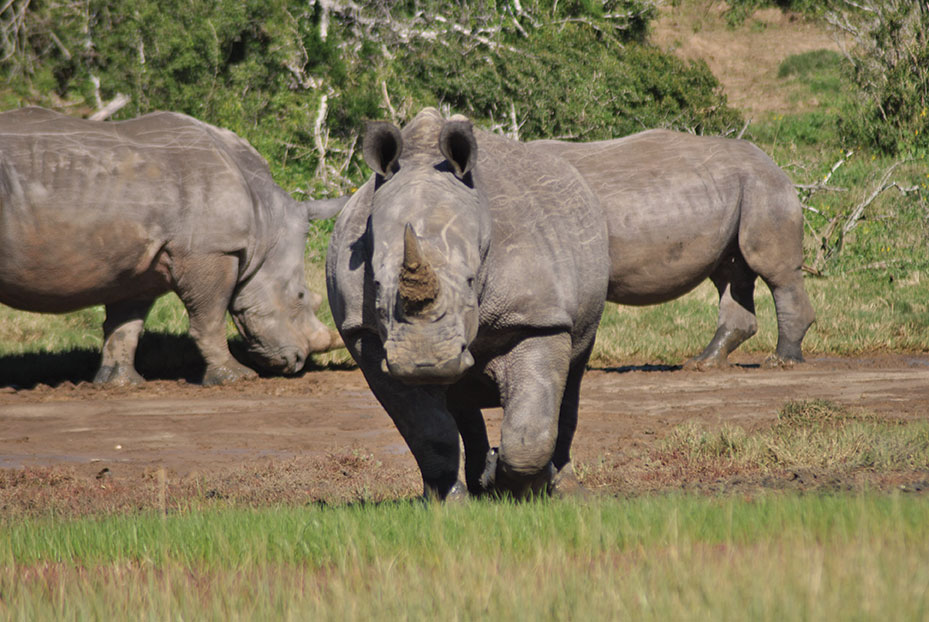

Discovering Global Citizenship, or How to Help a Vanishing Species
TCU’s award-winning international education program is making an impact on South Africa’s endangered rhinos.
At a game reserve on South Africa’s eastern Cape, Jimmy Greene watched wildlife veterinarians operate on Hope, a 4-year-old white rhinoceros. Several months before the TCU senior’s arrival at Amakhala, a wildlife refuge reclaimed from former farmland, poachers hacked into Hope’s skull for her horn. The veterinarians – for the fifth time – were attaching a guard to the young rhino’s forehead so the wound could heal.
Greene, an environmental science major, knew Hope’s story. He followed the young rhino’s precarious situation online before his summer 2015 study abroad trip. He knew Hope was one of the fewer than 24,000 rhinos remaining in southern Africa. The majestic animals are being slaughtered at a rate of 1,300 each year and face imminent extinction under the current escalation.
Seeing Hope made the concept of an endangered species hit home, Greene said. “When you’re up close and personal with the animal and hearing her, the pain and suffering that she was going through because of human greed, you want to change that.”
Having previously worked on a successful mangrove conservation and restoration project in Panama with TCU Global Academy, Greene knew his efforts could make a meaningful impact on the environment.
Both of Greene’s international experiences were outgrowths of TCU’s Discovering Global Citizenship initiative, a six-pronged plan to give all students, regardless of whether they travel abroad, opportunities to add international perspectives to classroom learning.
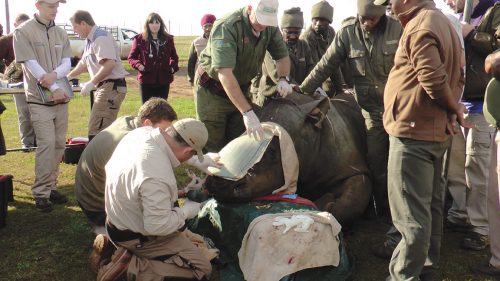
Veterinarians at Amakhala operate on a white rhino named Hope for the fifth time following her poaching. (Photo by Mike Slattery.)
In 2013, TCU administrators requested proposals to move the university into the future and better reflect its evolving student composition. TCU gave the proposal winner, originally called Purple Passport, funding for five years. What eventually became Discovering Global Citizenship was “a really good fit for us,” said Ed McNertney, director of TCU’s Core Curriculum, who was on the selection committee. After all, he said, TCU’s mission statement focuses on creating “ethical leaders and responsible citizens in the global community.”
Jane Kucko, who handles the study abroad programs as director of TCU’s Center for International Studies, co-authored the winning proposal with John Singleton, director of International Services. He coordinates specialized programs for the university’s roughly 650 foreign students.
In January 2015, the Institute of International Education awarded Kucko and Singleton’s Discovering Global Citizenship program the prestigious Andrew Heiskell Award for innovative international education. The winning campus progam was only in its second year. Due in part to the honor, Kucko hopes the university will extend the program beyond its initial five years.
All students need preparation for a world hurtling into uncharted territory, Kucko said. “How are they going to face these global realities that are coming their way, whether they’re ready or not?” The solution, she concluded: “We focused on bringing the world to TCU.”
Working to Save the Survivors
At the South African game reserve, Hope’s anesthetist was Dr. Will Fowlds, a wildlife veterinarian and co-owner of Amakhala. In 2012, Fowlds reached out to surgical colleagues who went on to found the conservation group Saving the Survivors and asked for the world’s help in addressing “an incredibly complex crisis” facing the rhinos.
Mike Slattery, a South Africa native and professor of environmental science at TCU, was aware of the possible rhino extinction but, at first, didn’t know how to provide assistance from Texas.
“The rhino in particular is really the last living dinosaur. This is the link to our prehistoric past.”
Mike Slattery
In 2014, Slattery nominated Fowlds for the Global Innovator Award, which the Discovering Global Citizenship committee gives biannually. The professor suspected Fowlds – and the rhinos – could benefit from the $25,000 cash prize and intended long-term association with TCU. Fowlds won the award, which allowed him to travel to Fort Worth.
Slattery knew the award wasn’t just about the veterinarian and the rhinos but also about bringing his TCU students into direct confrontation with a spiraling environmental catastrophe. “We can’t afford to lose this species because if this one goes, then others will go, and our heritage disappears from under our feet,” he said. “But the rhino in particular is really the last living dinosaur. This is the link to our prehistoric past.”
(Video produced by Sidney Dennis. Courtesy of TCU Rhino Initiative)
How they helped from the United States
A 9,000-mile journey to South Africa was not part of the original plan for the partnership between Fowlds and TCU. Initially, the veterinarian wanted to work with a student focus group to brainstorm what types of awareness messaging would best resonate with young audiences.
Before Fowlds’ visit in 2014, Slattery invited students to apply for the chance to participate in campus workshops with the noted conservationist. Fowlds asked the selected students what they could do from Fort Worth to help South Africa’s rhinos and then to create a plan of action to enact after his departure.
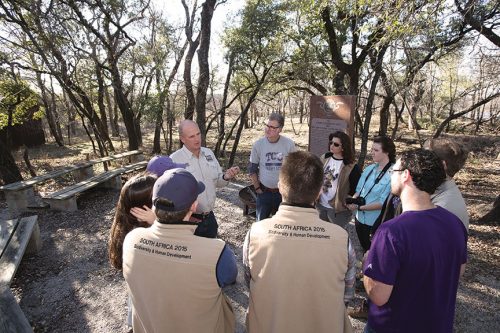
Will Fowlds visits with TCU students at the Fort Worth Nature Center & Refuge. (Photo by Carolyn Cruz.)
“It was a really big request that they asked of us because, for them, the U.S. is so pivotal,” said Sidney Dennis, a junior communication major.
Students learned physical protection of the rhinos is one piece of a global puzzle. In South Africa, apartheid’s long shadow of economic inequality drives poverty-stricken people to poach rhinos, whose horns, by weight, can fetch up to twice the price of gold.
Fowlds told the students to prioritize demand reduction in Asia, where wealthy people purchase rhino horn, erroneously believing it cures disease. (Rhino horn is made of keratin – the same substance in human fingernails – and cures nothing.)
Aspiring to work with wildlife as a career, Greene was disappointed that his internship at the Fort Worth Nature Center & Refuge conflicted with Fowlds’ planned series of workshops. But while he observed the center’s animals on a video screen, the celebrated conservationist, eager to see native North Texas wildlife, walked in the door. Greene forged a bond with Fowlds during a daylong hiking tour of the refuge.
When Slattery decided the rhino crisis was too crucial and too complicated to address from the TCU campus, he organized a study abroad trip to South Africa. Greene was one of the first students to apply.
South Africa Bound
Calling the study-abroad course “Biodiversity and Human Development in South Africa,” Slattery and Victoria Bennett, assistant professor of environmental science, took 15 students from a variety of academic majors on a three-week trip to his native country.
The group’s first stop was Johannesburg, where students visited an apartheid museum. Next, they moved to Amakhala, the 20-year-old, 20,000-acre wildlife reserve. Students and professors slept in the property’s air-conditioned and Wi-Fi outfitted Woodbury Lodge, where they sipped morning coffee while watching herds of zebra.
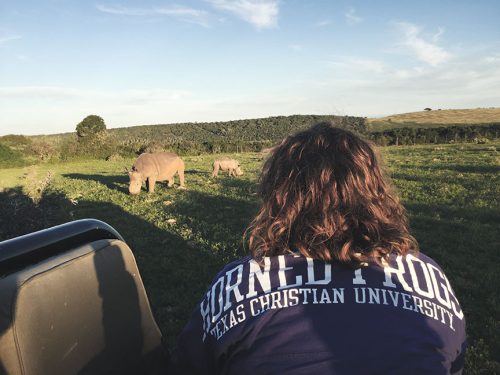
TCU student Mallory Melton observes Thandi, whose name means love in the Xhosa language, and her calf Thembi, whose name means hope. (Photo by Mike Slattery.)
The reserve’s small number of white rhinos are so protected that the TCU group had to disable cell phone geotagging lest poachers discover the animals’ specific locations through social media posts.
Students arrived with a quad-copter drone, which Fowlds purchased with some of his $25,000 innovator’s award. He uses the state-of-the-art machine to track rhinos darted by tranquilizers so they can’t disappear before being revived with an antidote.
During the stay in the eastern Cape, students wanted to see Thandi, a poaching survivor, and her months-old baby Thembi. The mother rhino was so badly injured when Fowlds found and operated on her in 2013, “she shouldn’t be here,” he said. Thandi now is petrified of loud noises and sometimes hides for days, which she did during the group’s visit.
But on the last afternoon, as the sun began to set across the African bush, Thandi emerged from the thicket with her calf Thembi, who nursed and then chased impala and wildebeest.
Students also saw Hope, and while her operation was tough to watch, for Katie Smith, it was valuable to witness. “You just got to see how terrible the actual act of poaching is,” said the junior environmental science major. “But you did get to see the hope side of it. She’s still alive, and that’s quite a feat for that kind of injury.”
After Amakhala, the group traveled to Cape Town. They went to impoverished neighborhoods as well as tourist attractions. Slattery said he wanted to help students understand the connection between the conditions of humans and animals.
Greene said the trip, for him, was a mixed bag of highs, lows and soul searching. “We saw a lot of negative things, and a lot of things discouraged us. So seeing Hope struggle, seeing the local communities that don’t have the basic necessities for life. Seeing just some of the cultural struggles that they have there, that was really hard for us.
“But it wasn’t that we just saw it and we went back to the place where we were staying and just put it out of our minds,” he said. “We had intellectual discussions. We talked about how we can make change. While there might be challenges, we can make the difference.”
(Courtesy of the TCU Rhino Initiative)
Global Citizenship and Changing the World
“I think we’re about giving these students a broad education so they’ve got the tools to tackle these societal problems when they cross the stage,” said Slattery. “That’s why I’ve never left this university.”
The group returned to campus with a “toolbox” of videos of Amakhala’s rhinos, related environmental data, veterinary expense estimates and lots of ideas. “Basically, here’s the rhino crisis,” Slattery said. “Now what do we do with that? How do we respond?”
Most of the study-abroad students enrolled in a follow-up fall course to continue the conversation. During a class in November, they dissected video clips in which they expressed their passion for protecting rhinos, arranging acceptable snippets onto a storyboard. The final video became part of a multifaceted awareness campaign that includes the TCU Rhino website.
The class also discussed details of the Rhino Run, which happened at Amon G. Carter Stadium in March. The proceeds helped with Hope’s ongoing surgeries. Students wanted to raise additional money so Fowlds’ organization can purchase more veterinary equipment, better technology (including rhino tracking collars), and training fees for dogs that guard the rhinos during long nights in the bush.
“We are the technology that we need to save the planet.”
Patrick Ryan
Students contributed their individual strengths and academic expertise. For example, Sydney Parise, a senior strategic communication major, researched background details to help with a grant proposal to the U.S. Fish and Wildlife Department.
Kayce Denkhaus, a studio art major, exhibited her photos and paintings of rhinos on the Bridges of Imagination connecting Rees-Jones Hall and Mary Couts Burnett Library.
Some environmental science majors are working with Neeley School of Business students on a community ownership model in the theory that, if surrounding communities had a financial stake in Amakhala’s rhinos, they would be more likely to protect the animals.
Patrick Ryan, who plans to pursue a master’s degree in environmental science after his graduation in May, discovered applicable wisdom through helping rhinos: “What the scientists are finding is that we all need to be taking steps to preserve our planet, and it falls on all of us. We are the technology that we need to save the planet.”
The Vietnam Connection
TCU’s largest international student population hails from Vietnam, which along with China is the world’s main market for rhino horn.
Tu Huynh, president of the Vietnamese Student Association, conducted an anonymous poll on her group’s Facebook page. She asked if anyone had family members who bought rhino horn, an illegal practice, or believed in its curative power. To her dismay, 39 percent of the respondents admitted to being related to horn-buying consumers, and 9 percent believed in the myth of its pharmaceutical powers.
While Slattery and his students were in South Africa watching Hope’s disquieting operation, Huynh was in her native Ho Chi Minh City, visiting family and gauging levels of awareness about the rhino crisis.
“It’s exciting to see how this is bubbling over to action on the ground that’s making an impact.”
Will Fowlds
The good news, Huynh said, is that most young Vietnamese people understand the rhinos’ predicament and the uselessness of their horns. But “the older generation,” she said, “they believe that the rhino horn can cure a lot of diseases, even cancer.”
To help with the rhino project, Huynh and other Vietnamese students at TCU are translating into their native language audiovisual materials that Slattery’s class generates. They plan to share those public service materials with media outlets in Vietnam.
The student group also hosted a rhino awareness event on campus in January. In a twist of luck, Fowlds made a surprise visit to Texas at the same time and spoke at the packed public lecture.
During the event, Nguyen Le, vice president of the student association, shared a difficult personal story. When she was in high school, her father was in an accident and lost use of one hand. Desperate to regain the hand’s function, he purchased rhino horn. During her freshman year at TCU, Le learned about the pointlessness of consuming rhino horn. In a panic over her personal connection to the vanishing species, Le immediately educated her parents, who stopped purchasing rhino horn.
“It’s exciting to see how this is bubbling over to action on the ground that’s making an impact,” Fowlds said at the event.
Why International Education
Slattery has organized another summer study-abroad trip to South Africa. In the near future, he hopes to take a group of Vietnamese students to Amakhala too.
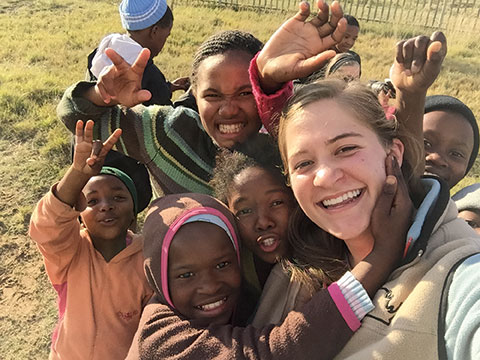
Sidney Dennis takes a selfie with kids at the Isipho HIV and AIDS Center, which the Amakhla Foundation supports. (Photo by Sidney Dennis.)
The professor said the global citizenship program “takes people, and it takes this university, this privileged environment that we live in, and it opens up our eyes to how the rest of the world lives.
“But also, importantly, it opens up the possibility of our students and our faculty and our staff and our alums helping to solve some of these issues,” Slattery said, “because we do have resources.”
Sidney Dennis, the communication major, said working with Fowlds showed that she could make a difference. Whatever direction her eventual career takes, she said: “I want to be in an organization or a company that’s doing something to change the world.”
Greene will begin graduate studies at TCU in the fall and will continue his rhino conservation work.
Standing behind the scenes are the designers of Discovering Global Citizenship. “We feel like we’re changing the conversation at TCU,” said Jane Kucko.
Will Fowlds reconnected with Mike Slattery and TCU Rhino Initiative students on a January, 2016 visit to the Fort Worth Nature Center & Refuge. (Photos by Carolyn Cruz.)
Want more? Listen to the inaugural TCU Magazine Podcast featuring several Discovering Global Citizenship participants, including Mike Slattery:
https://soundcloud.com/tcu-magazine/discovering-global-citizenship-podcast







Your comments are welcome
Comments
Related reading:
Features
Global Reconciliation via Skype
What Discovering Global Citizenship’s Virtual Voyage initiative taught students about forgiveness.
Saving the Rhinos is a Global Responsibility
At a public lecture, wildlife veterinarian Will Fowlds said his partnership with TCU is “bubbling over to action on the ground that’s making an impact.”
Campus News: Alma Matters
A Purple Passport to Global Leadership
How TCU creates citizens of the world.